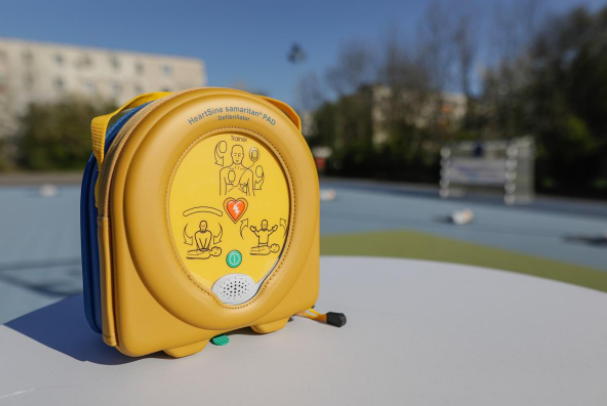Sometimes, hearts suddenly stop working, even in unexpected places. So, having a defibrillator at home, in your car, or in public places is essential. Defibrillators can bring people back to life if their heart suddenly stops at home or in public.
This article will discuss why defibrillators are essential in emergencies and how they can save lives. Stay tuned to find out more.
The Significance of Prompt Defibrillation
You have probably heard this repeatedly, but timely emergency response is critical.
Out-of-hospital cardiac arrests only have a survival rate of 10%; however, this rate can go four times higher if a bystander witnesses the emergency and uses a defibrillator within the first 5 minutes to administer a shock.
Without immediate first aid, the victim will experience the following: First, their heart will stop pumping blood and oxygen. This means their most essential organs, including the brain, will be at greater risk.
After the first minutes, the chances of survival will be there, but the victim will incur brain damage afterward. If the cardiac arrest lasts for 8 minutes, death is likely to occur.
That means defibrillation and CPR should be started ASAP to give a high-energy shock to the heart and make it start beating again.
Importance of Defibrillators
Increased Survival Rates
As mentioned earlier, defibrillators for emergencies can increase the survival rate by four times the hire rate. According to a study aimed to assess the effectiveness of defibrillators, the survival rate was reduced by 10% per minute when defibrillation was delayed.
The survival rate increased to 25.5% when a defibrillator was used immediately and 33% higher when CPR and chest compression were appropriately combined.
Having an automated Heartsine defibrillator at hand means that you are in a better position to administer CPR within the first 5 minutes and restore the victim’s normal heart rhythm without causing any brain damage.
User Friendly Design
If you are ever in a position where you need to use a defibrillator, trust your gut and do so. Yes, you don’t need training for effective defibrillator use, as many options, like Heartsine 360p defibrillators and more, come with easy-to-follow visual and verbal guides.
While calling an ambulance may seem like the wisest decision at the moment, the victim will only be at risk of death. You only have at least 5 minutes to save the person, and the ambulance may take longer. Not to worry!
Automated external defibrillators have user-friendly features, including audio, text, and visual prompts. Once the device is on, you will have a voice instructing you on what to do.
Make sure the victim’s chest is bare. This allows for the secure placement of the electrode pads, which will scan for the heart rhythm and help determine if a shock is needed.
If a shock is required, the device will automatically administer the shock. If you are using a semi-defibrillator, a voice prompt will alert you to push the button.
Portable and Versatile
Automated external defibrillators are lightweight, weighing as little as 2.1 lbs. So, don’t worry about them being heavy to carry around.
If you struggle to place them on the victim’s chest, that shouldn’t be a problem. They are portable and easy to store without taking up much space.
Before you order a defibrillator for an emergency online, we recommend you review the weights and sizes available. Pictures can be misleading, so check the size and weight. Keep in mind that a small size will always be lighter.
Minimal Risk of Harm
Much health damage can occur if a defibrillator isn’t used immediately. Most of your vital organs become deprived once your heart stops pumping blood and oxygen.
Brain damage is the most common health damage after the first 5 minutes. Restoring the heart’s normal rhythm using a Heartsine defibrillator helps minimize such risks.
Common Myths and Misconceptions About Defibrillators
Defibrillators are Hard to Operate
We bet everyone here thinks you must have completed a training course to use a defibrillator. That’s not the case.
It’s more like you have a person to guide you through the process. It’s just that it’s not an ideal person but a voice guiding you every step of the way.
Plus, they are readily available in most public buildings, so you can grab them to test. However, there is no harm if you need training to be fully prepared. You can check out the most suitable course for you online.
You Will Only Make Things Worse
It’s better to try and save a life than to watch a person die with a defibrillator within your reach. We mean to say that if you don’t use the defibrillator, the victim will die. Plus, to calm your mind, the defibrillator for an emergency will not let you administer the shock if it’s not needed. All you need to do is apply the pads to the chest, switch on the machine, and let it guide you. What could go wrong with that?
A Defibrillator Will Always Restore the Heart’s Rhythm
An automated external defibrillator like Heartsine 360p increases the survival rate, giving the victim the best chance. It doesn’t always guarantee that the person will return to life once the shocks are administered.
Accessibility of Defibrillators in Public Spaces Can Save Lives
The survival rates are four times higher if bystanders witness the emergency. However, this requires a defibrillator to be nearby and for the bystander to be confident using it.
Now, of the 400 cardiac arrests that occur weekly across Australia, nine are treated with publicly accessible defibrillators.
That said, increasing accessibility in public spaces, including school and commercial buildings, can double the survival rate of cardiac arrest.
Now that you have seen the importance of defibrillators, are you ready to equip yourself with one and keep your loved ones safe?
If yes, explore Heartsine 360p defibrillators and other automated external defibrillators to find the best fit – get started today.

